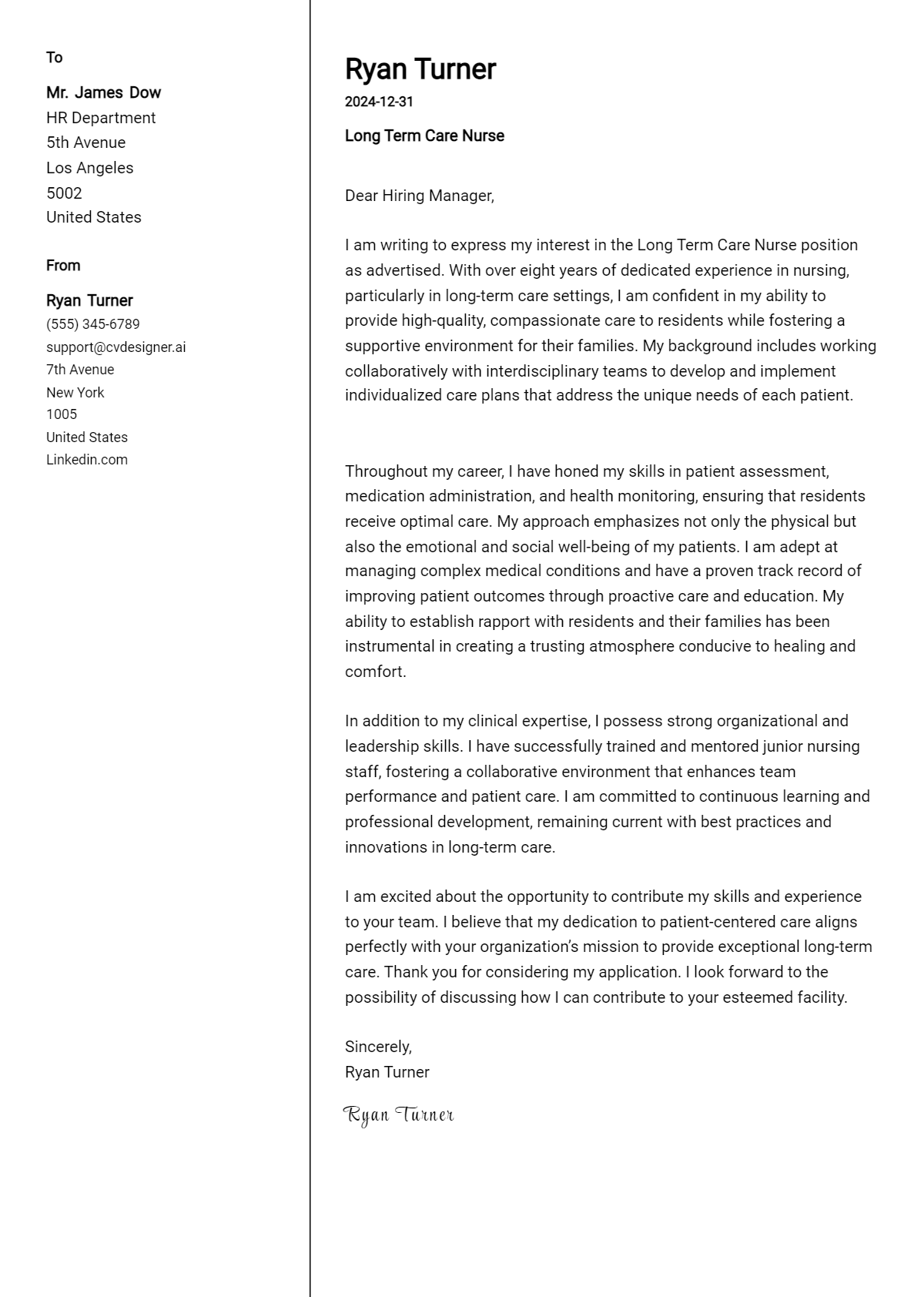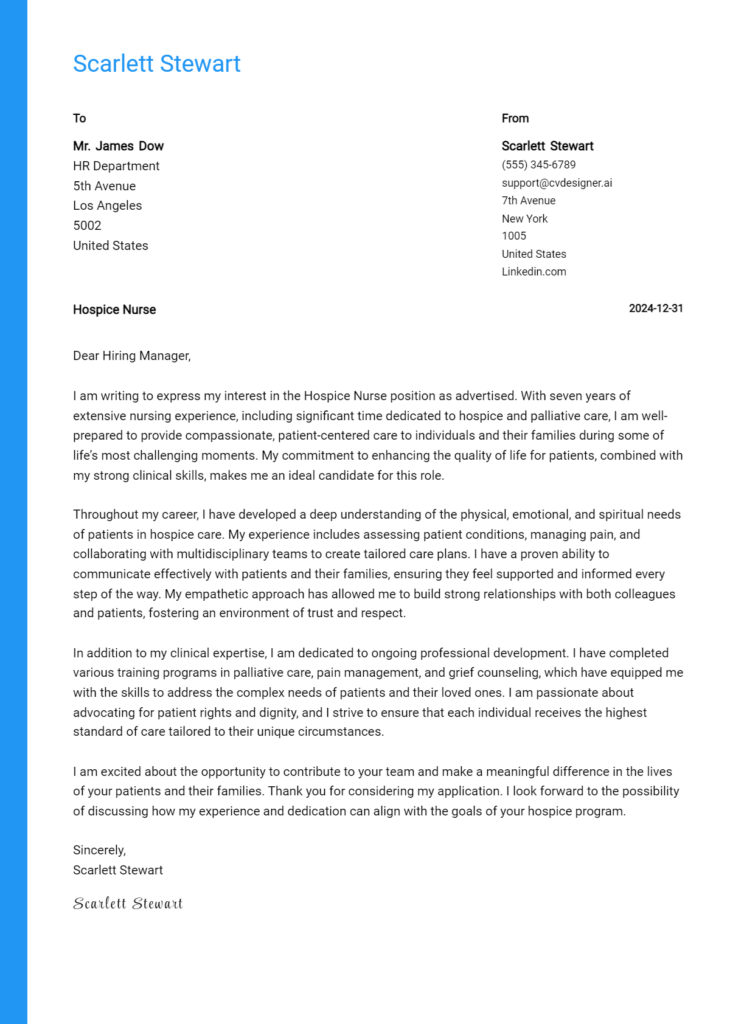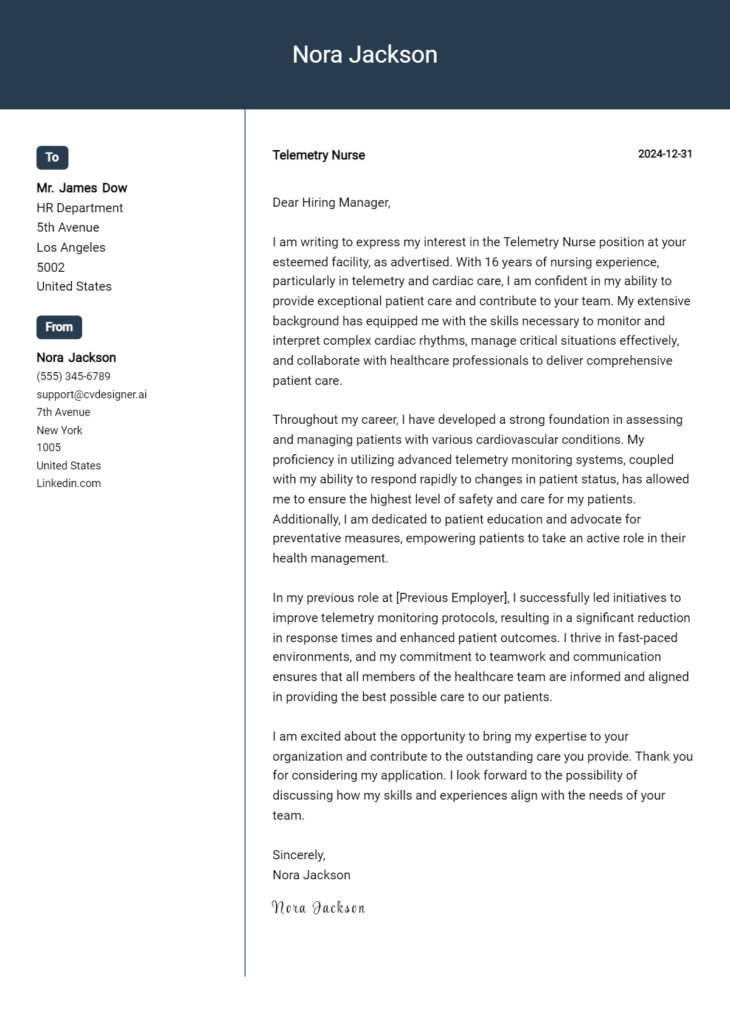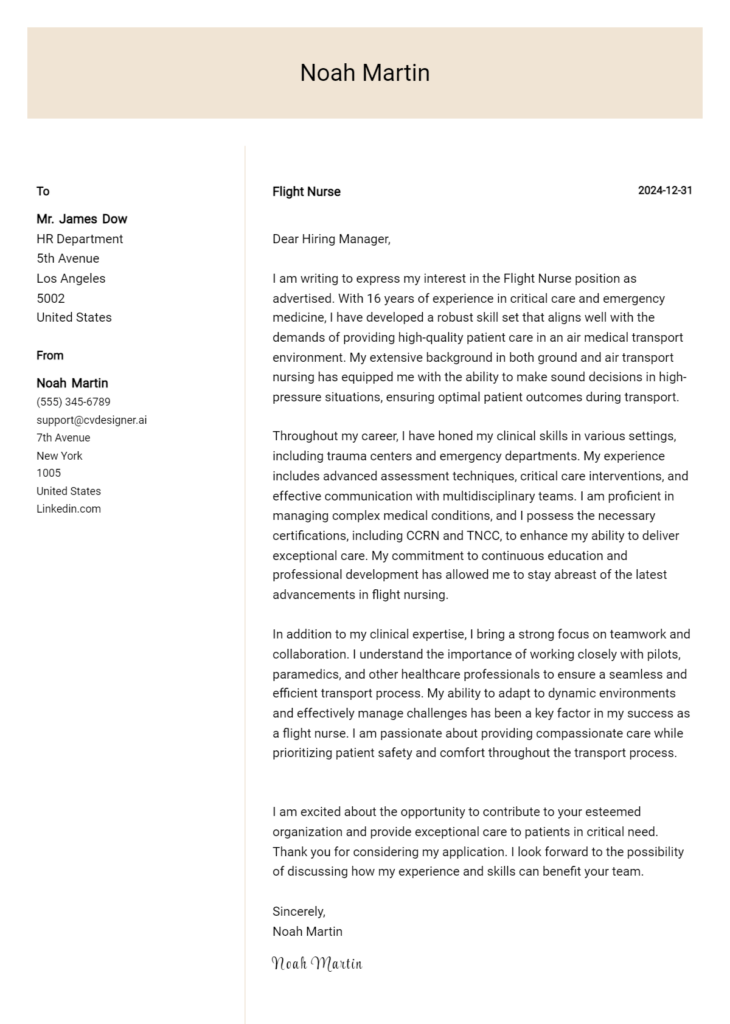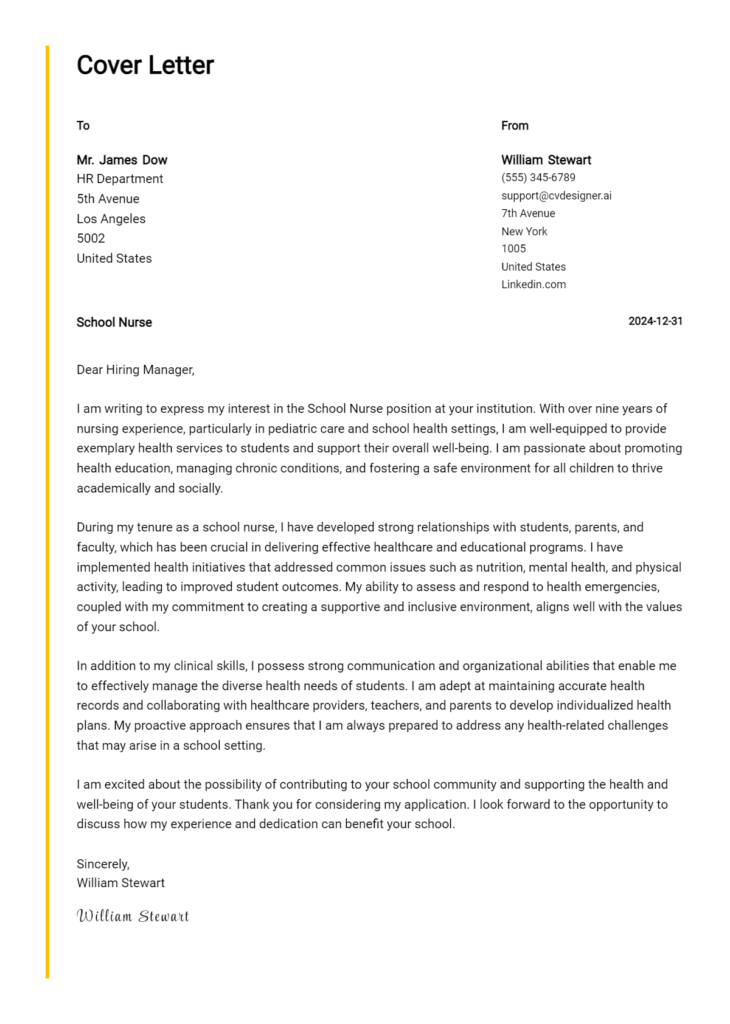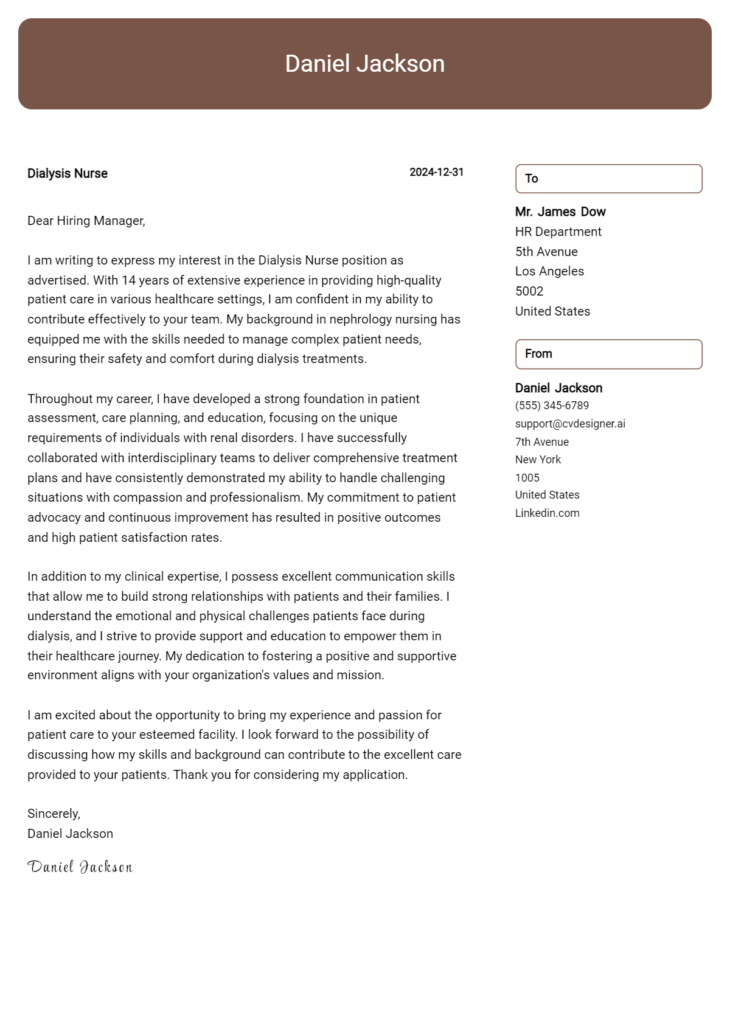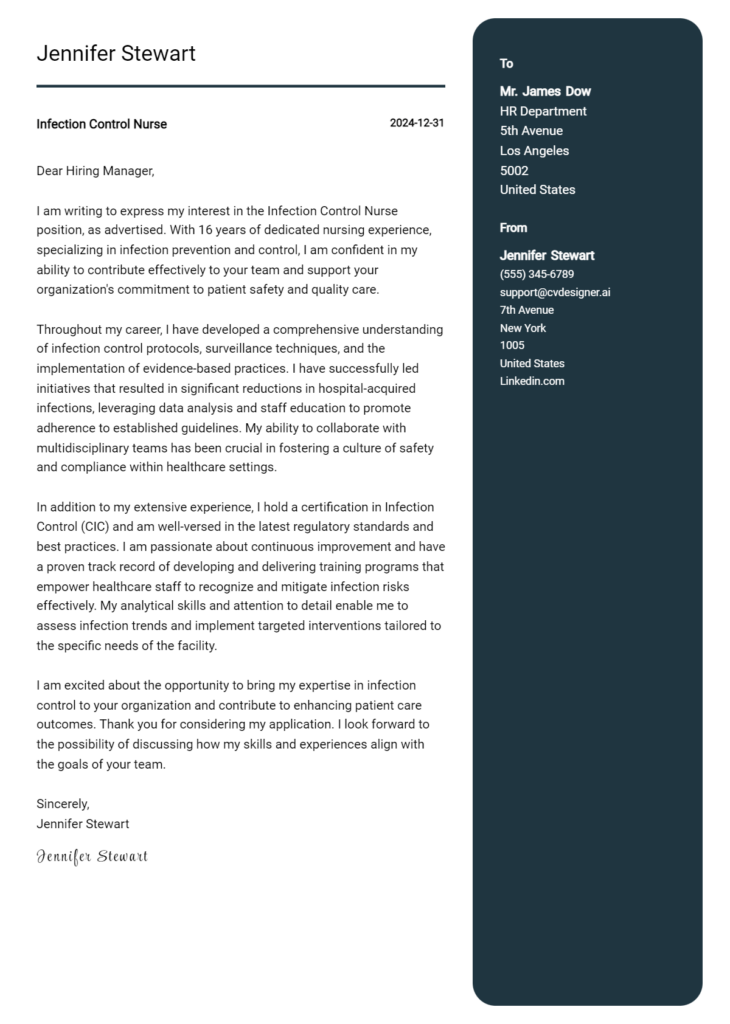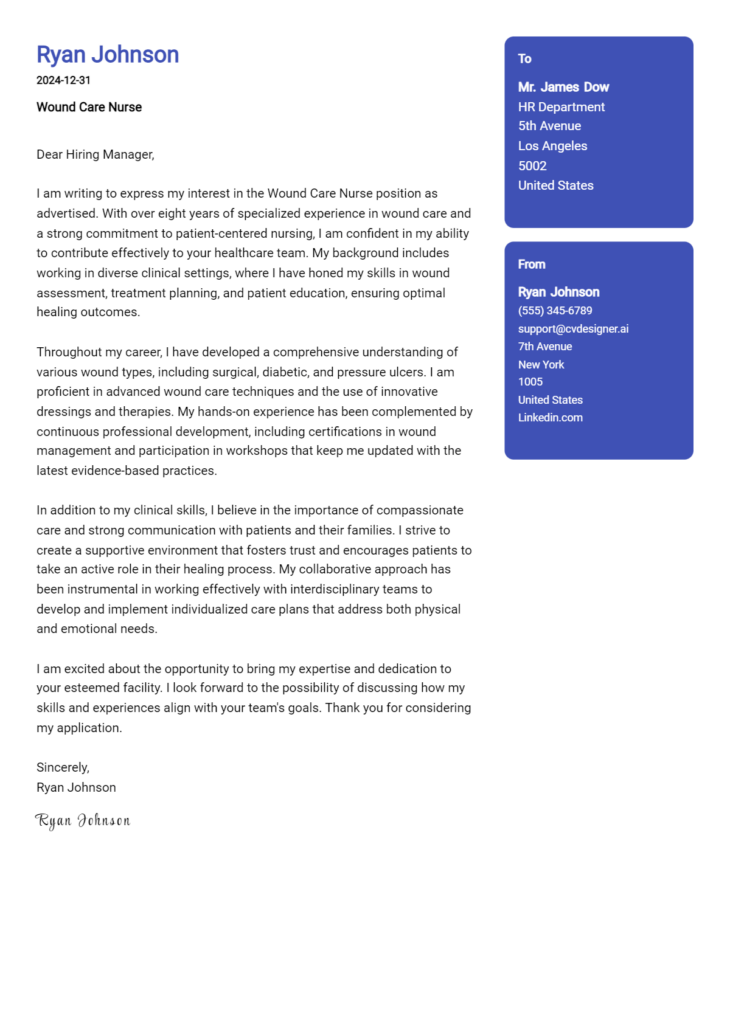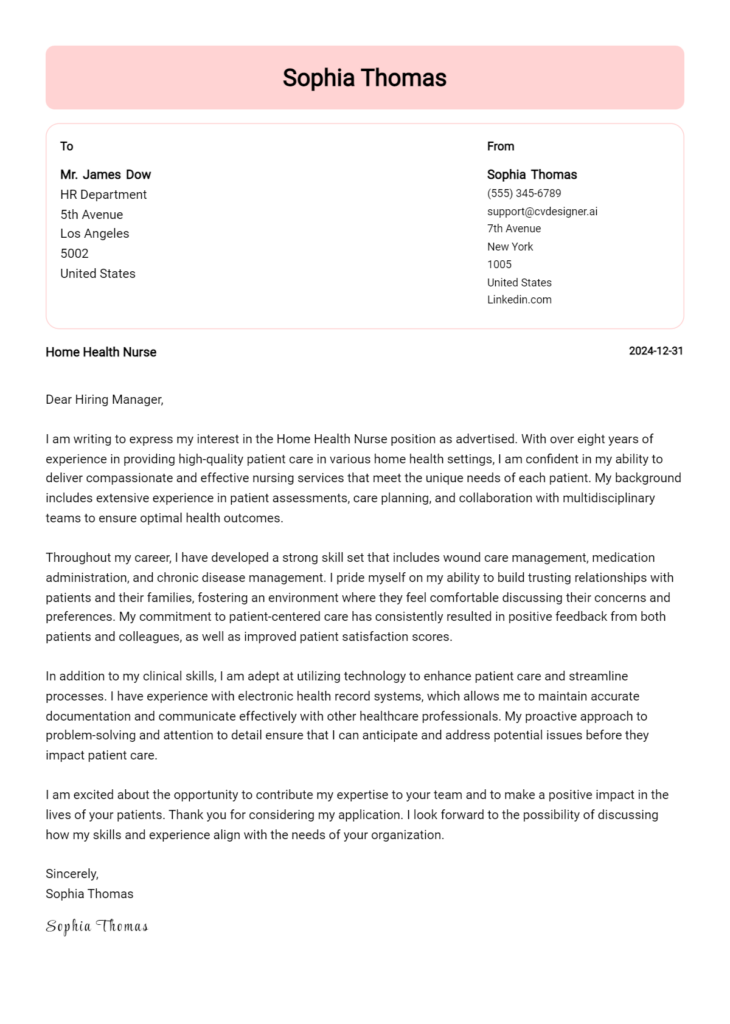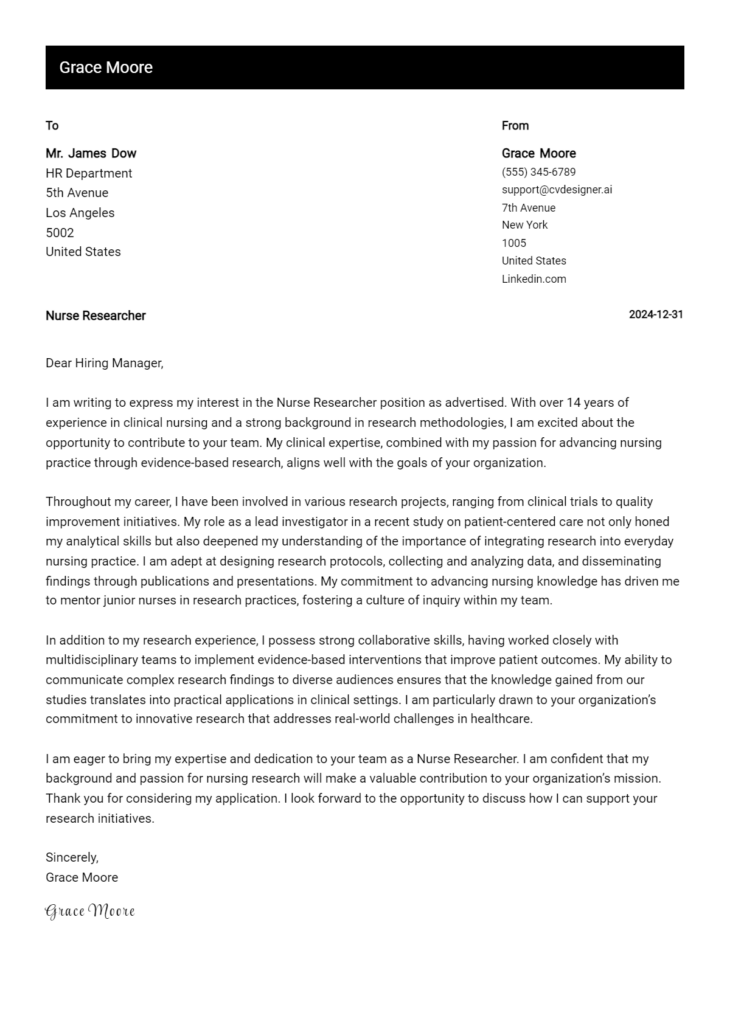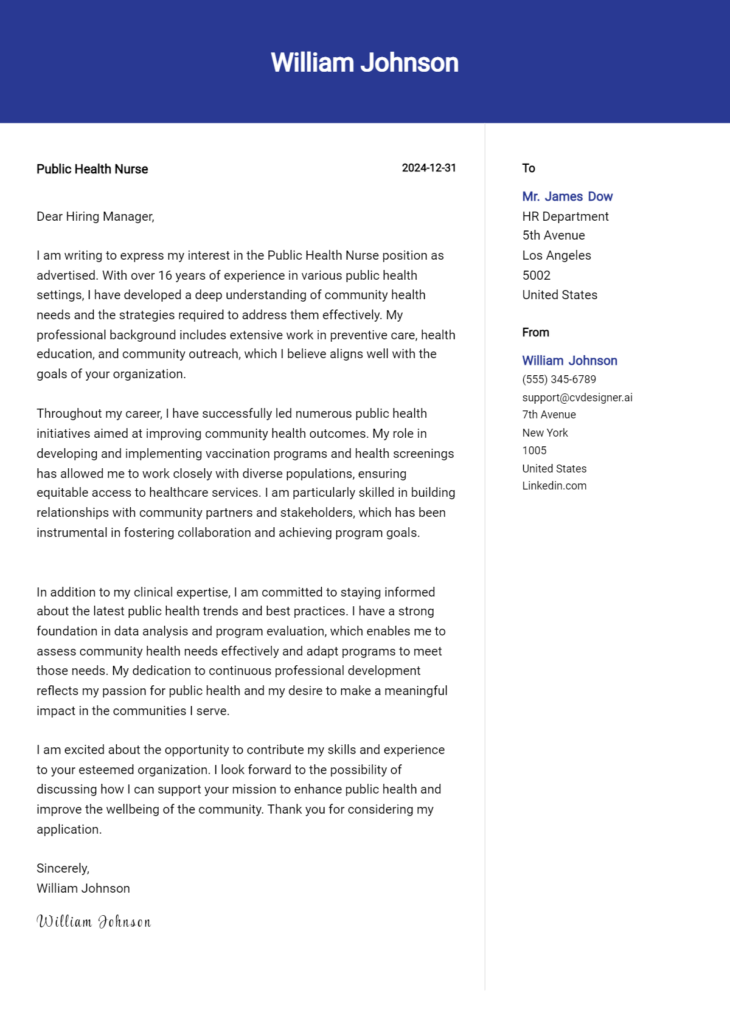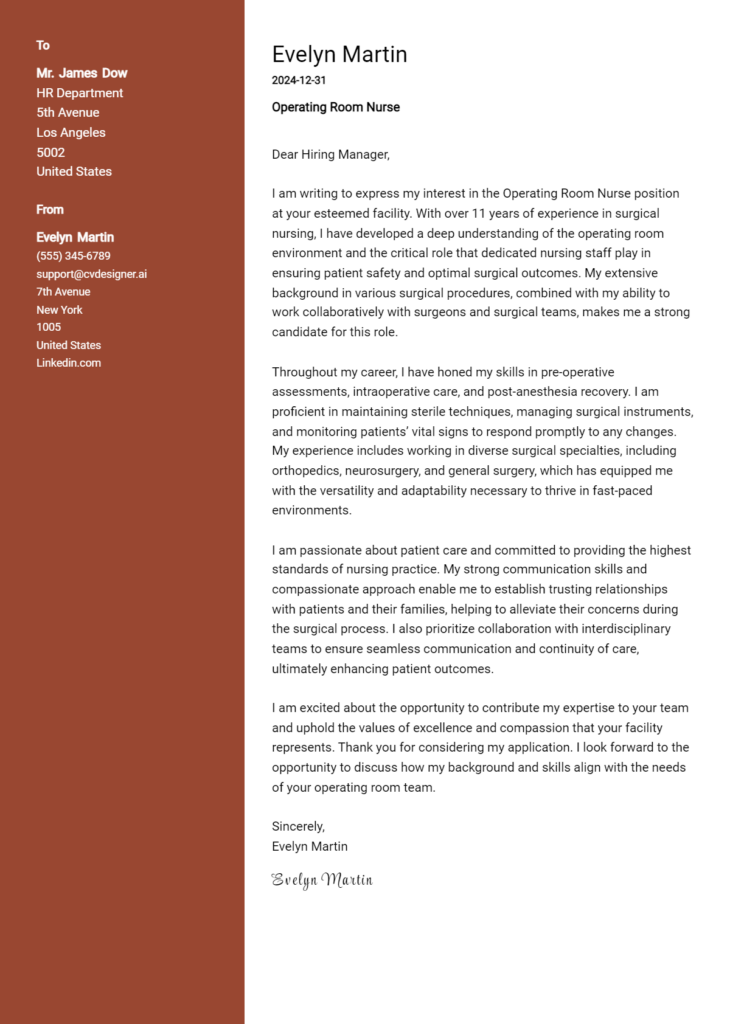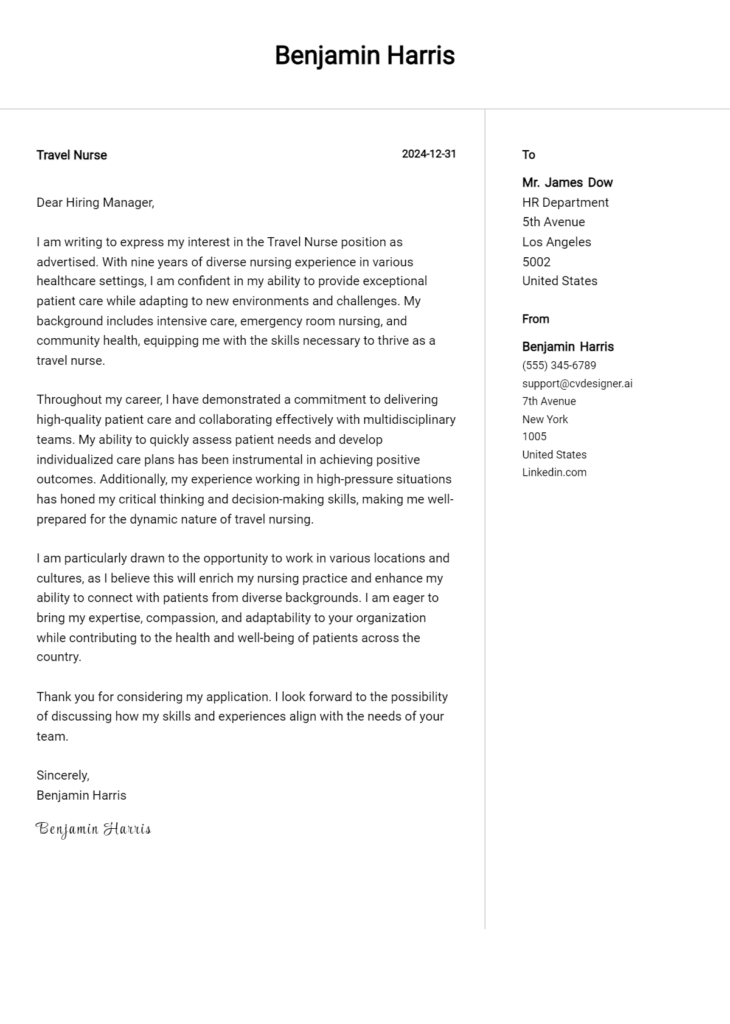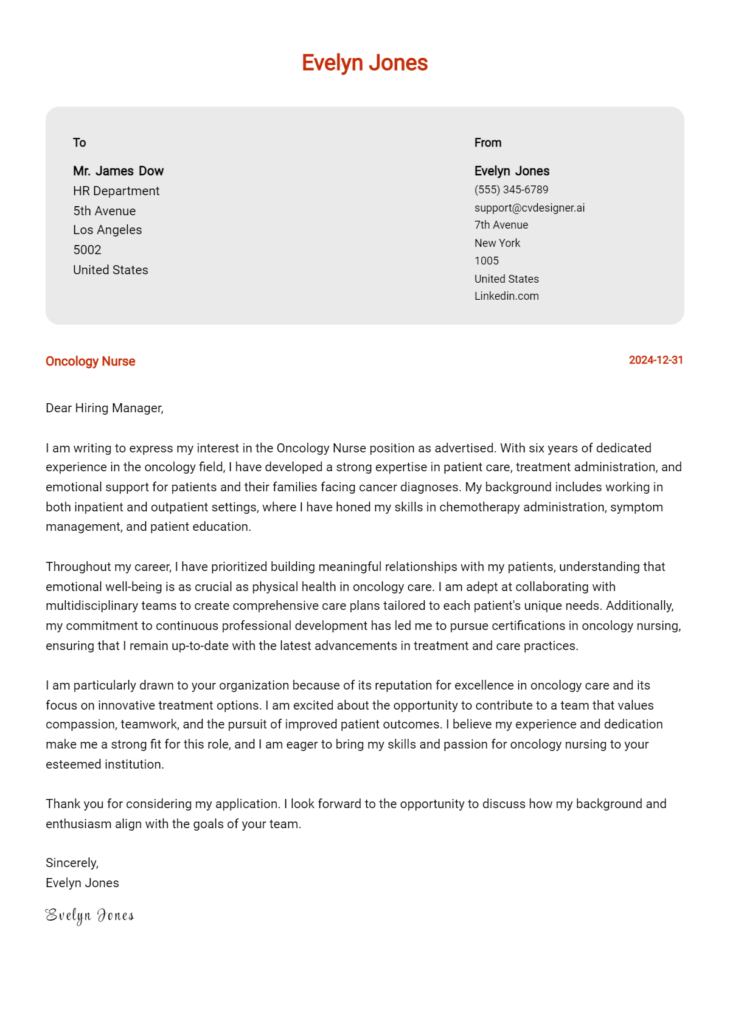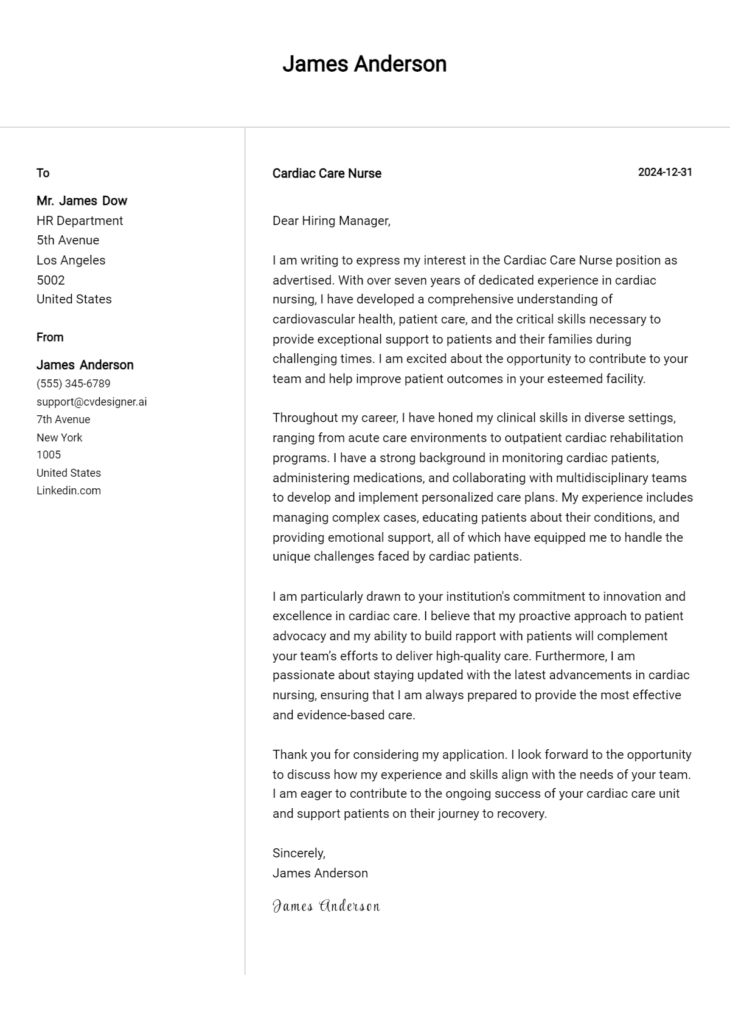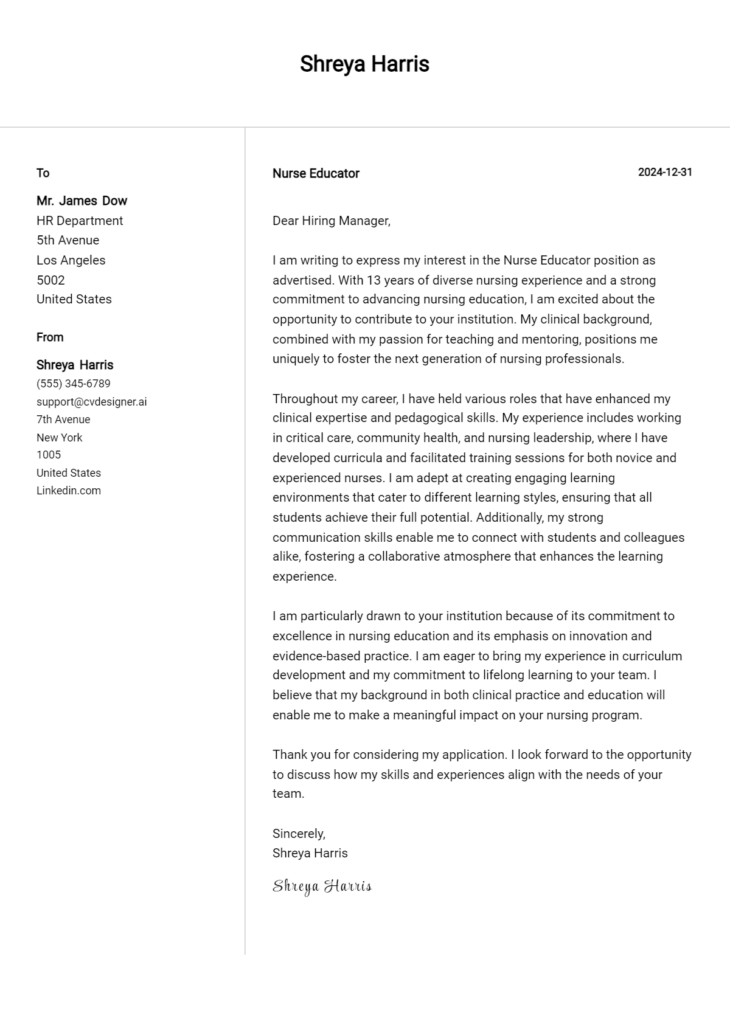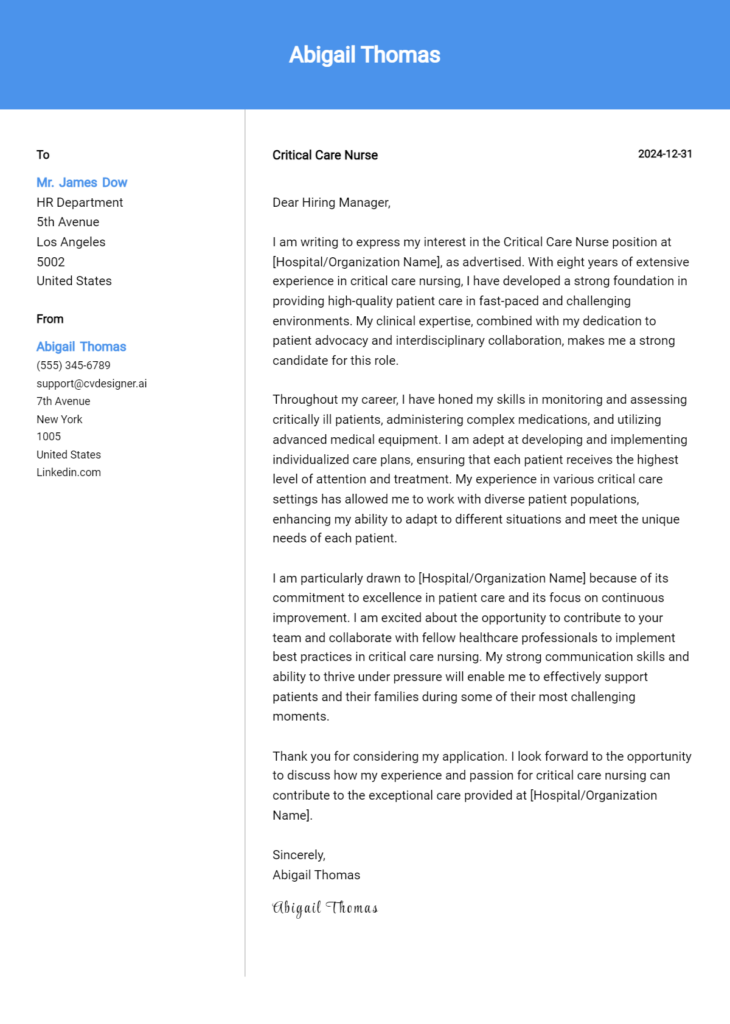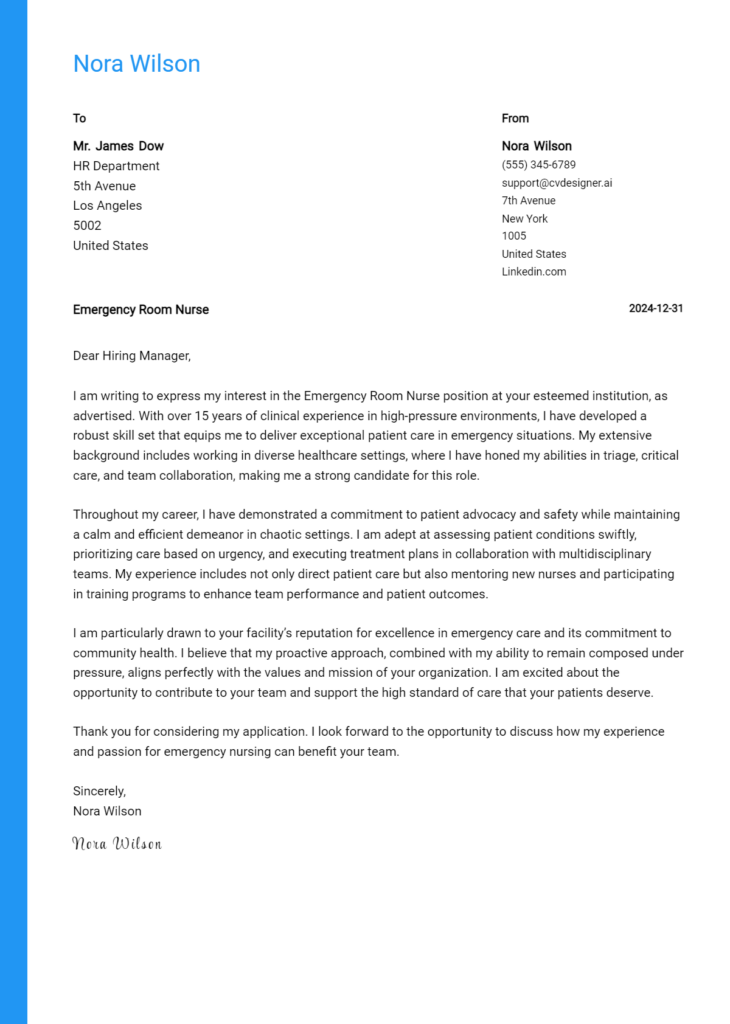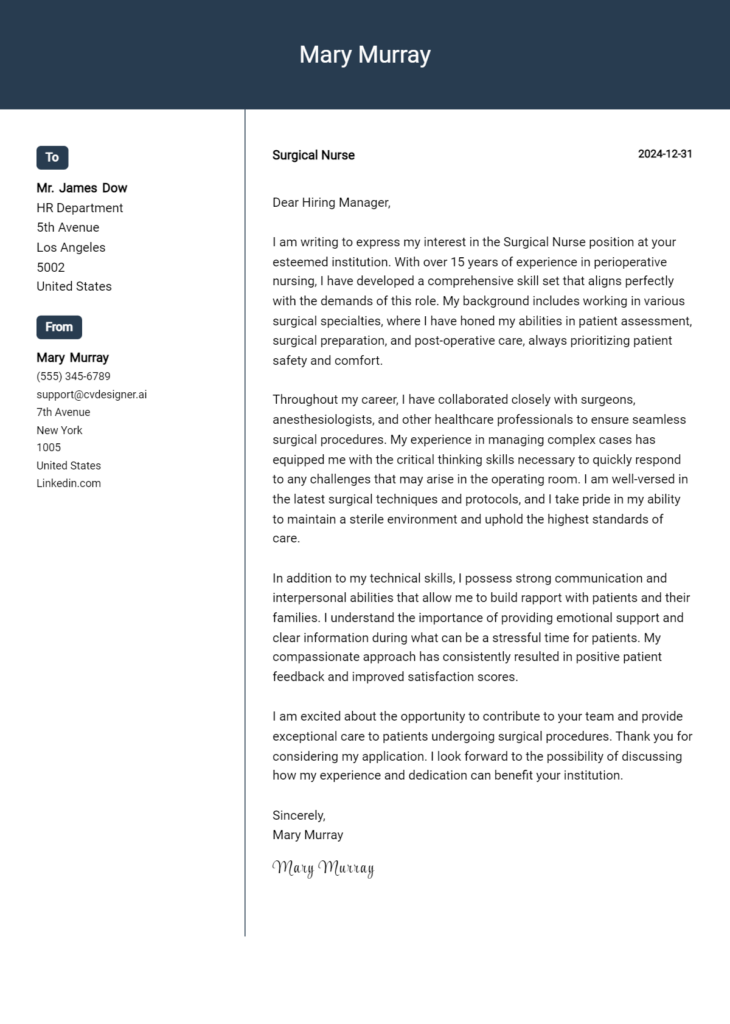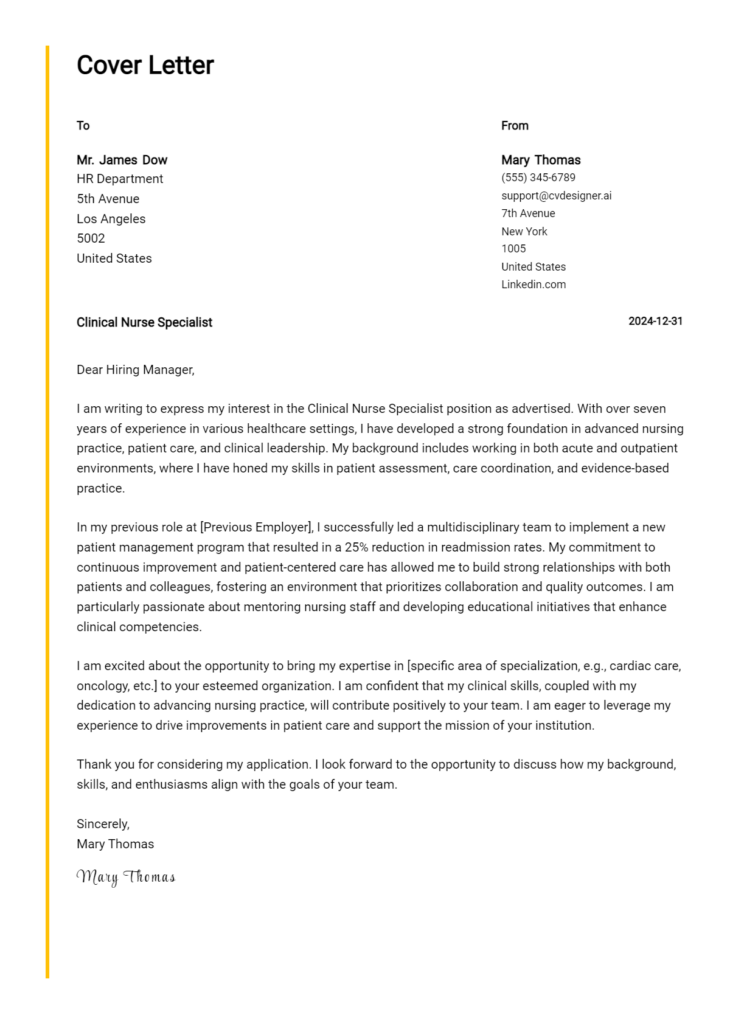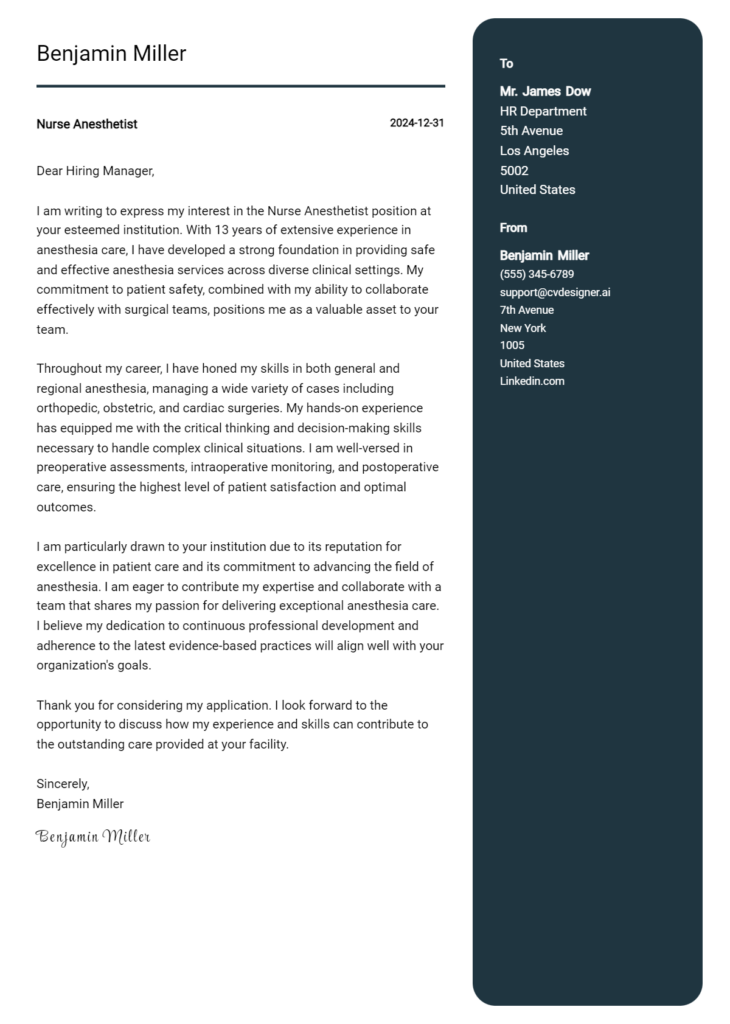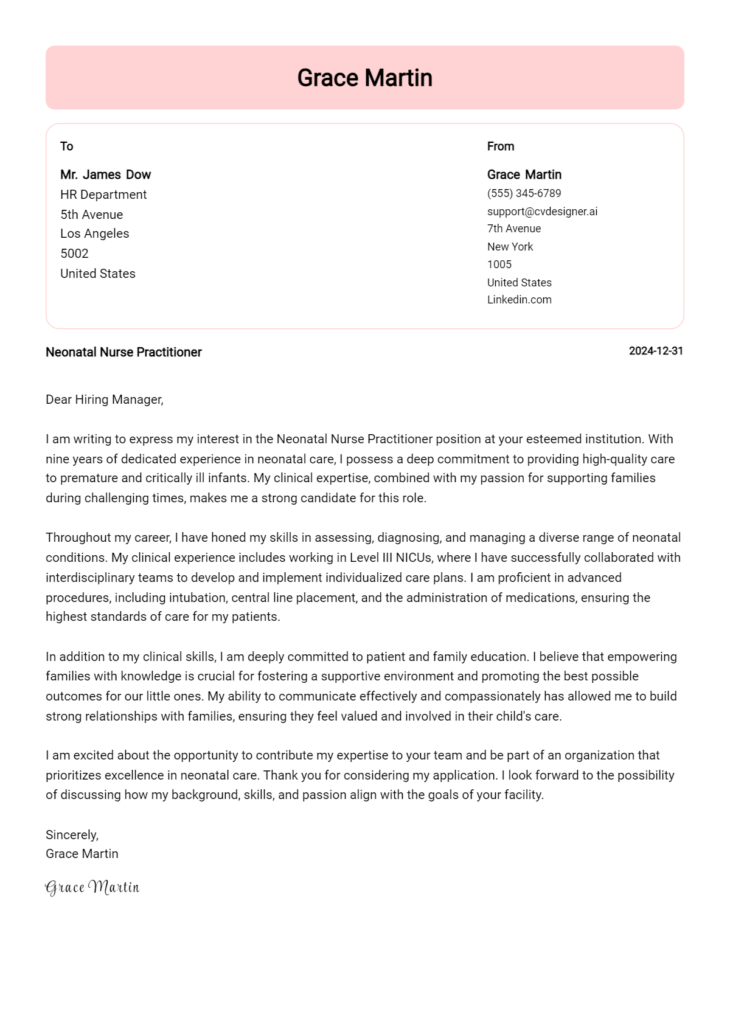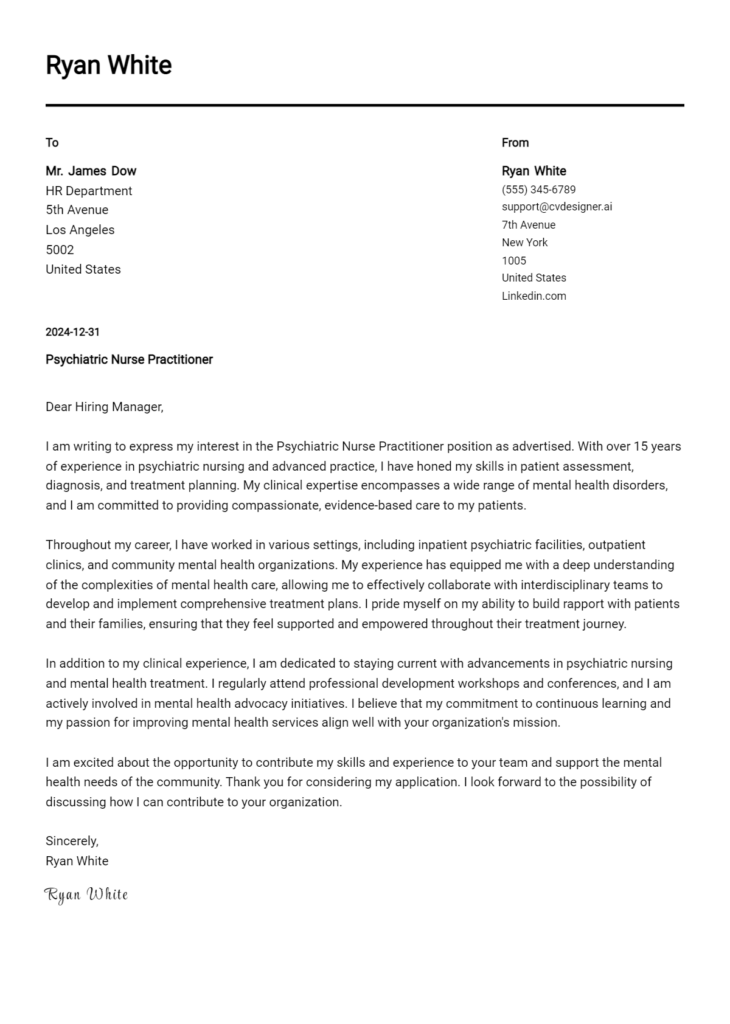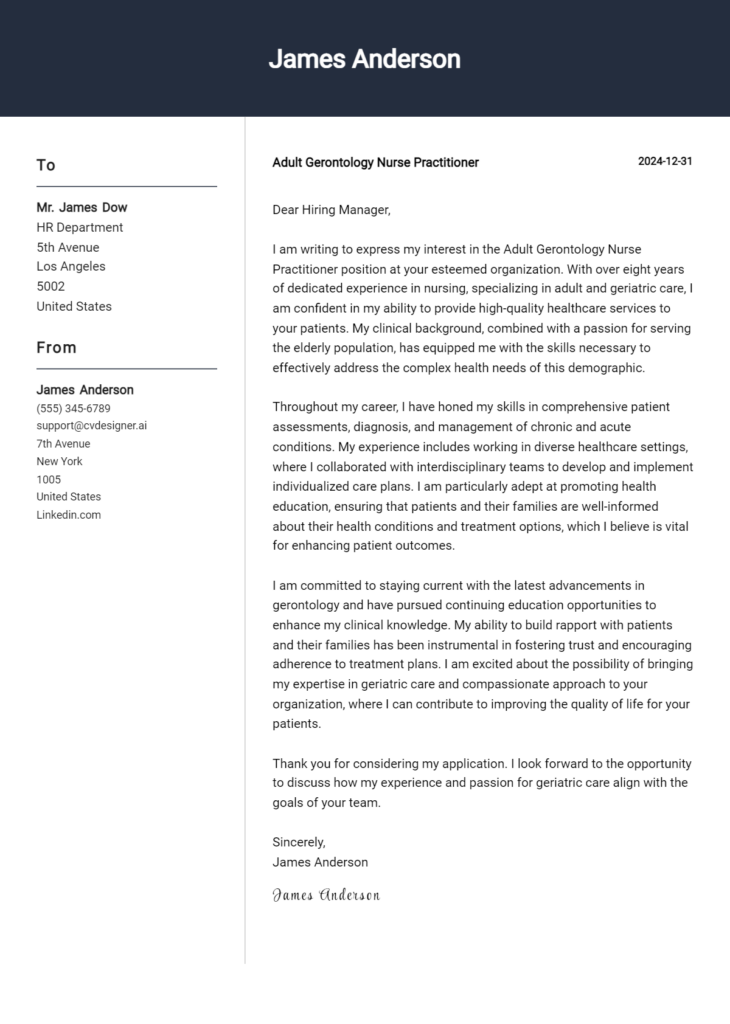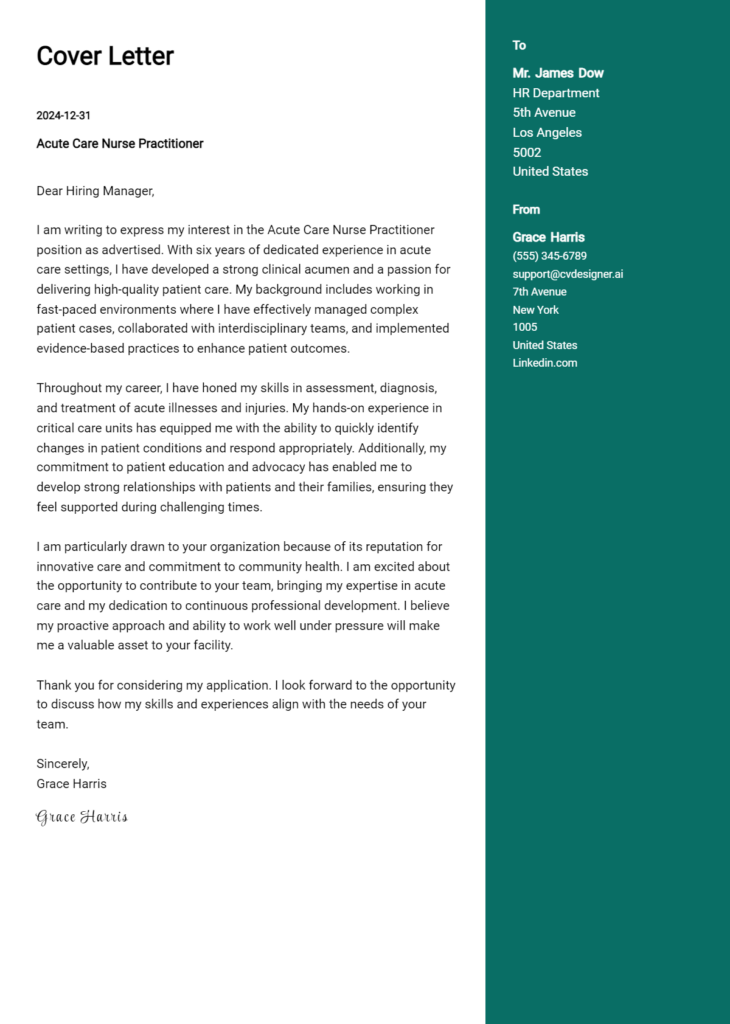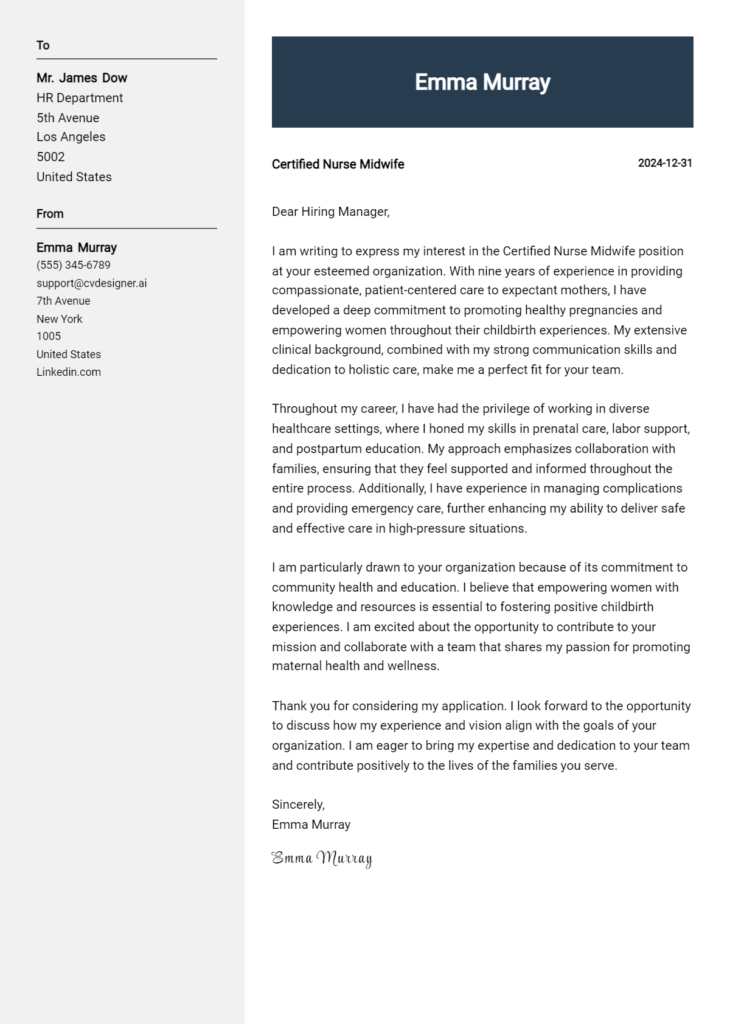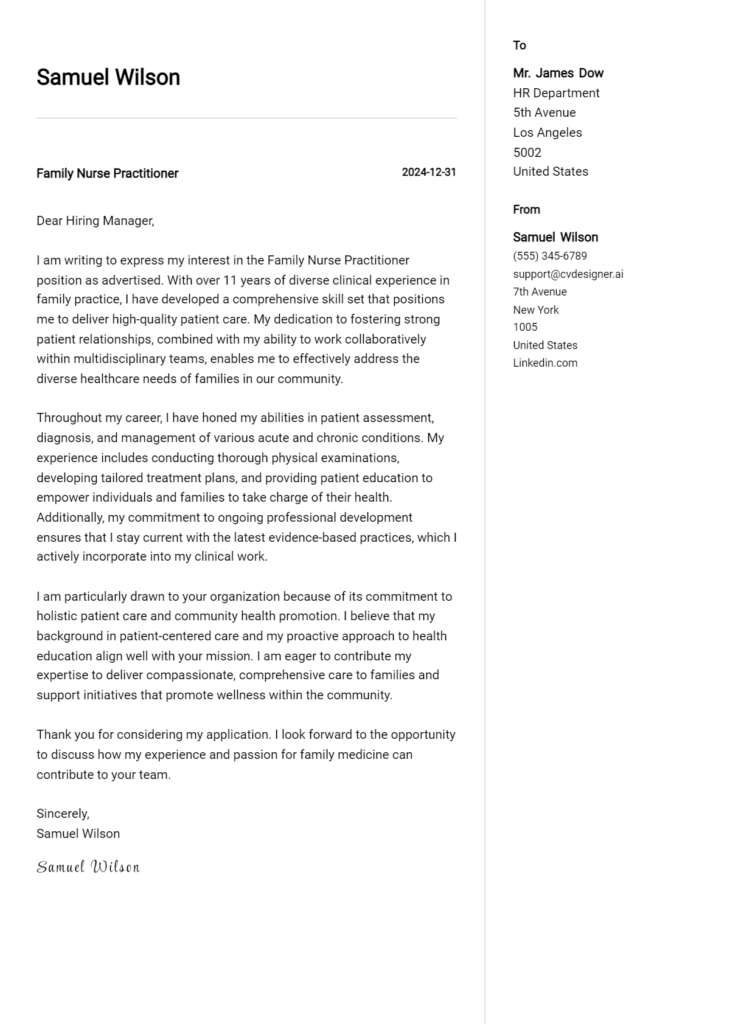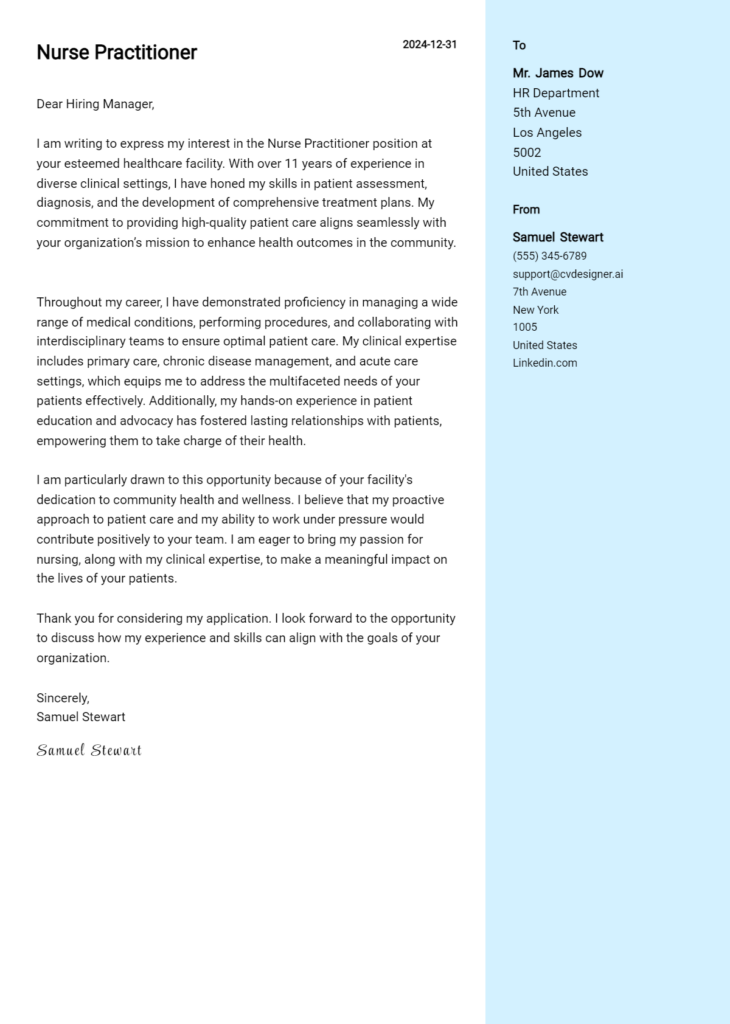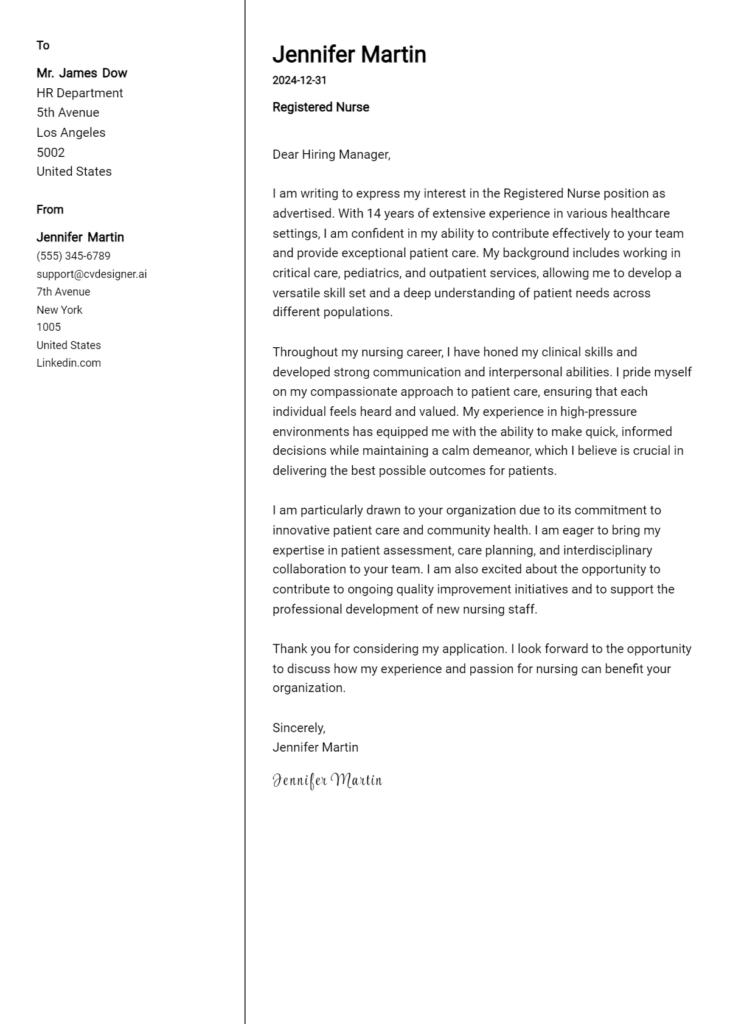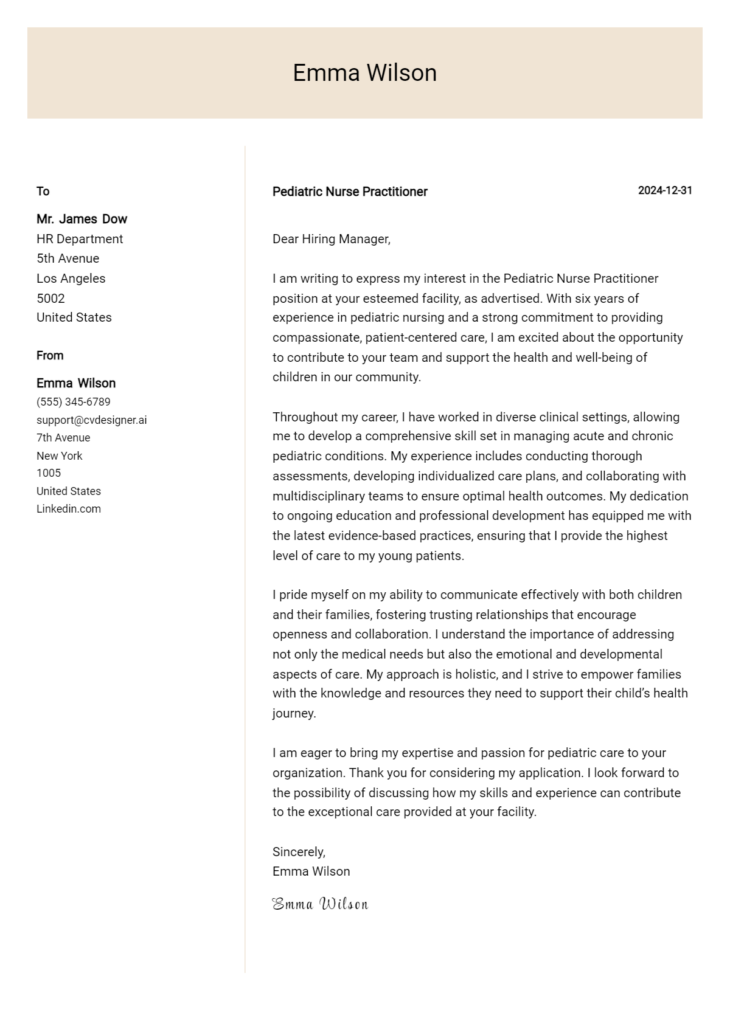Long Term Care Nurse Cover Letter Examples
Explore additional Long Term Care Nurse cover letter samples and guides and see what works for your level of experience or role.
How to Format a Long-Term Care Nurse Cover Letter?
Crafting an effective cover letter is essential for Long-Term Care Nurses, as it serves as your first opportunity to connect with potential employers and convey your passion for patient care. The way you format your cover letter not only showcases your qualifications but also demonstrates your organizational skills and professionalism—traits that are vital in the nursing field. A well-structured cover letter captures the hiring manager's attention, allowing you to highlight your experience and dedication to providing high-quality care for residents in long-term facilities.
In this guide, we'll outline the key components of a professional cover letter, including:
- Cover Letter Header
- Cover Letter Greeting
- Cover Letter Introduction
- Cover Letter Body
- Cover Letter Closing
Each section plays a crucial role in showcasing your strengths and suitability for the position. Let’s delve into the specifics of each part to help you create a standout cover letter as a Long-Term Care Nurse.
Importance of the Cover Letter Header for a Long-Term Care Nurse
A well-structured cover letter header is essential for a Long-Term Care Nurse as it establishes professionalism and clarity right from the start. The header should include your contact information, the date, and the recipient's details, which helps the hiring manager identify who the application is from and when it was submitted. An organized header can create a positive first impression and enhance the overall presentation of your application. Clarity is key, as it allows the reader to quickly find the information they need without confusion.
An example of a strong header will clearly set out this information in a professional format, while a weak header may lack essential details or appear cluttered and unprofessional.
Strong Example
Jane Doe 123 Main Street Cityville, ST 12345 (123) 456-7890 janedoe@email.com October 1, 2023 Hiring Manager Long-Term Care Facility 456 Care Lane Townsville, ST 67890
Weak Example
Jane D 10/01/23 To Whom It May Concern,
The Importance of a Cover Letter Greeting for a Long-Term Care Nurse
The greeting of a cover letter plays a crucial role in setting the tone for the rest of the application. It is the first impression a hiring manager will have of you, and thus, it demonstrates your professionalism and attention to detail. A personalized greeting that directly addresses the hiring manager shows that you have taken the time to research the organization and its staff, which can help build a connection right from the start. To avoid sounding generic, it is advisable to look up the name of the hiring manager or the relevant contact person at the facility. This not only reflects your enthusiasm for the position but also indicates that you value the opportunity to communicate with them directly.
Here are examples of strong and weak greetings to illustrate the difference:
Strong Greeting Example
Dear Ms. Johnson,
Weak Greeting Example
To Whom It May Concern,
Importance of a Well-Crafted Cover Letter Introduction for a Long-Term Care Nurse
A well-crafted cover letter introduction is crucial for a Long-Term Care Nurse, as it serves as the first impression to the hiring manager. This opening paragraph should grab attention, convey a genuine interest in the role, and highlight key skills or achievements that align with the job requirements. A strong introduction not only piques the reader's interest but also sets the tone for the rest of the letter, showcasing the candidate’s qualifications and passion for providing high-quality care to patients in a long-term setting. Conversely, a weak introduction may fail to engage the reader, leaving them unimpressed and less inclined to continue reading. Below are examples of strong and weak cover letter introductions for a Long-Term Care Nurse position.
Strong Example
Dear [Hiring Manager's Name], I am excited to apply for the Long-Term Care Nurse position at [Facility Name], as advertised on [Job Board]. With over five years of dedicated experience in geriatric nursing and a proven track record of enhancing patient quality of life, I am confident in my ability to contribute positively to your team. My commitment to compassionate care, coupled with my expertise in managing complex health conditions, aligns perfectly with [Facility Name]’s mission of providing exceptional long-term care to residents.
Weak Example
To Whom It May Concern, I am writing to apply for the Long-Term Care Nurse job. I have worked in nursing for a while and think I would be a good fit. I can do many things related to patient care, but I am not sure what else to say.
Purpose of the Cover Letter Body for a Long-Term Care Nurse
The body of a cover letter for a Long-Term Care Nurse serves as a critical opportunity to showcase the candidate's relevant skills, experiences, and overall value to the prospective employer. This section allows the applicant to delve into specific projects or accomplishments that demonstrate their ability to provide high-quality patient care, manage complex medical needs, and work effectively within a healthcare team. By highlighting practical examples, such as successful implementation of care plans or initiatives that improved patient outcomes, the candidate can paint a vivid picture of their qualifications and commitment to long-term care nursing.
Strong Example
In my previous role at Happy Valley Nursing Home, I led a quality improvement project focused on enhancing the nutritional care of our residents. By collaborating with the dietary team and conducting thorough assessments, we successfully increased resident satisfaction scores by 30% in just six months. Additionally, my experience in managing a diverse patient population has honed my ability to provide individualized care, ensuring that each resident's unique needs are met. I am passionate about fostering a compassionate environment and believe my dedication to patient-centered care aligns perfectly with your facility's mission.
Weak Example
I have worked as a nurse for several years. I like taking care of patients and think I would be a good fit for your nursing home. I have done many things in my job, such as giving medications and checking vital signs. I hope to bring my experience to your team.
Importance of the Cover Letter Closing for a Long-Term Care Nurse
The closing paragraph of a cover letter plays a crucial role in leaving a lasting impression on hiring managers. For a Long-Term Care Nurse, summarizing qualifications, reiterating interest in the role, and encouraging next steps are essential components of an effective closing. A strong closing not only reinforces the candidate’s suitability for the position but also demonstrates enthusiasm and proactivity about the opportunity. Conversely, a weak closing can leave the impression of disinterest or lack of professionalism. Below are examples that highlight the difference between a strong and weak closing paragraph.
Strong Example
Thank you for considering my application for the Long-Term Care Nurse position. With my extensive experience in patient care and dedication to enhancing the quality of life for residents, I am excited about the opportunity to contribute to your team. I look forward to the possibility of discussing my qualifications in more detail and am eager to share how I can support your mission of providing exceptional care. Please feel free to review my resume, and I hope to schedule an interview soon.
Weak Example
Thanks for looking at my cover letter. I think I would be okay at the Long-Term Care Nurse job. If you want to talk more, you can reach out. Anyway, I hope you find someone good for the position.
These tips will assist candidates in crafting an impactful cover letter for a Long-Term Care Nurse position, showcasing their technical skills, problem-solving abilities, knowledge of the Software Development Life Cycle (SDLC), teamwork, and a passion for continuous learning. A well-structured cover letter not only highlights your qualifications but also reflects your dedication to providing high-quality patient care in a long-term care setting.
Tips for Writing a Cover Letter for Long-Term Care Nurse Position
Emphasize Technical Skills: Clearly outline your technical competencies that are crucial for a Long-Term Care Nurse role. This includes proficiency in electronic health records (EHR) systems, medication administration, and patient assessment tools. Highlight specific software or tools you've used and how they improved patient outcomes. Using cover letter templates can help you format this section effectively.
Showcase Problem-Solving Abilities: Provide specific examples of challenges you've faced in previous nursing roles and how you successfully addressed them. This could involve managing complex patient needs, coordinating with interdisciplinary teams, or developing care plans. Illustrating your problem-solving skills will demonstrate your capability to handle the unique challenges of long-term care.
Highlight Knowledge of SDLC: If applicable, mention your understanding of the Software Development Life Cycle, especially if you’ve been involved in implementing or training staff on health care technologies. This shows that you can navigate the intersection of healthcare and technology, which is increasingly important in long-term care environments.
Illustrate Teamwork and Collaboration: Long-term care relies heavily on teamwork. Share examples of how you've worked collaboratively with other healthcare professionals, such as physicians, therapists, and social workers, to provide holistic care. Emphasizing your ability to function effectively within a team can set you apart from other candidates.
Express Passion for Continuous Learning: The field of healthcare is always evolving, and a commitment to lifelong learning is essential. Mention any relevant certifications, training programs, or workshops you've undertaken. This not only shows your dedication to professional growth but also reassures potential employers of your commitment to providing the best care possible.
By following these tips and utilizing tools like a cover letter builder, you can create a compelling cover letter that stands out to hiring managers in the long-term care sector.
Common Mistakes to Avoid in a Long-Term Care Nurse Cover Letter
Crafting a compelling cover letter is essential for making a strong impression as a Long-Term Care Nurse. Avoiding common mistakes can significantly enhance your chances of landing an interview. Here are some frequent pitfalls to watch out for:
- Generic Content: Failing to personalize your cover letter can make it blend in with others. Always tailor your letter to the specific job and facility.
- Lack of Specific Examples: Not providing concrete examples of your experience can weaken your application. Use specific instances to showcase your skills and achievements in long-term care.
- Ignoring Cover Letter Format: Neglecting proper formatting can make your letter hard to read. Follow a clear cover letter format to ensure it looks professional.
- Typos and Grammatical Errors: Mistakes in spelling and grammar can detract from your professionalism. Always proofread your letter or use tools to catch errors.
- Overly Lengthy Letters: Writing too much can lose the reader's interest. Keep your cover letter concise, ideally one page, focusing on your most relevant skills.
- Focusing Solely on Yourself: While it's important to highlight your qualifications, remember to address how you can benefit the facility. Emphasize your commitment to patient care.
- Neglecting to Include a Call to Action: Failing to express your desire for an interview can leave your letter feeling incomplete. End with a strong statement inviting further discussion.
By being mindful of these common mistakes, you can create a more effective cover letter that stands out. For inspiration, check out some cover letter examples to guide your writing.
Cover Letter FAQs for Long-Term Care Nurse
What should I include in my cover letter as a Long-Term Care Nurse?
In your cover letter, highlight your experience and skills specific to long-term care. Start with a brief introduction of yourself and your nursing background. Emphasize your understanding of the unique needs of long-term care patients, such as elderly individuals or those with chronic illnesses. Mention any relevant certifications, such as CPR or specialized training in geriatric care. Discuss your interpersonal skills, showcasing your ability to communicate effectively with patients, families, and multidisciplinary teams. Additionally, include specific examples of your accomplishments, like improving patient care metrics or enhancing residents' quality of life. Finally, express your passion for providing compassionate care and your commitment to the values of the facility you’re applying to.
How can I tailor my cover letter for a specific long-term care facility?
Tailoring your cover letter for a specific long-term care facility requires research and attention to detail. Start by reviewing the facility’s website to understand its mission, values, and patient demographics. Mention any specific programs or initiatives they have that resonate with your experience or interests. Use keywords from the job description to align your skills with their needs. For example, if the facility emphasizes a person-centered approach, discuss your experience implementing similar strategies in your previous roles. Highlight any connections you have with the community or the facility’s reputation, and share how your goals align with theirs. By personalizing your letter, you demonstrate genuine interest and increase your chances of making a strong impression.
What tone should I use in my cover letter as a Long-Term Care Nurse?
The tone of your cover letter should be professional yet compassionate, reflecting the nature of long-term care nursing. Use respectful language that demonstrates your understanding of the sensitivity required in this role. Aim for a warm and empathetic tone, as this mirrors the qualities essential for working with long-term care patients and their families. Avoid overly formal language; instead, opt for a conversational style that conveys your personality. Balance professionalism with sincerity by sharing your motivations for applying and your dedication to patient care. This approach will help you connect with the hiring manager on a personal level while showcasing your qualifications and enthusiasm for the position.
How long should my cover letter be for a Long-Term Care Nurse position?
Your cover letter should be concise, ideally one page in length. Aim for three to four paragraphs that clearly convey your qualifications and passion for long-term care nursing. Start with a strong opening paragraph that grabs attention, followed by a second paragraph detailing your relevant experience and skills. In the third paragraph, you can focus on your understanding of the facility’s mission and how you can contribute to it. Finally, include a brief closing paragraph that reiterates your enthusiasm for the role and expresses your desire for an interview. Keeping your cover letter succinct ensures that hiring managers can easily read and absorb the information, making them more likely to consider your application.
Build your Cover Letter in minutes
Use an AI-powered cover letter builder and have your letter done in 5 minutes. Just select your template and our software will guide you through the process.

